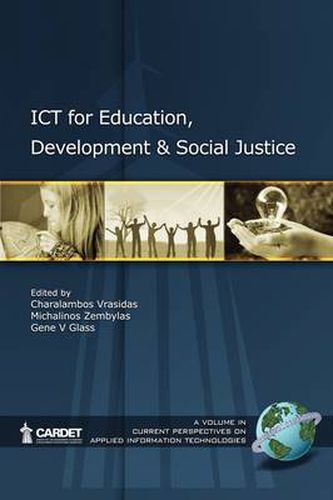Readings Newsletter
Become a Readings Member to make your shopping experience even easier.
Sign in or sign up for free!
You’re not far away from qualifying for FREE standard shipping within Australia
You’ve qualified for FREE standard shipping within Australia
The cart is loading…






This title is printed to order. This book may have been self-published. If so, we cannot guarantee the quality of the content. In the main most books will have gone through the editing process however some may not. We therefore suggest that you be aware of this before ordering this book. If in doubt check either the author or publisher’s details as we are unable to accept any returns unless they are faulty. Please contact us if you have any questions.
A volume in Current Perspectives on Applied Information Technologies Series Editors Charalambos Vrasidas and Gene V Glass This volume provides examples of current developments on the role of ICT for education, development, and social justice within an international context. Chapters draw on advanced contemporary thinking from scholars and practitioners in the field to present case studies of how ICT can be used to promote sustainable development and social justice. Social justice is understood in a wide sense as the pursuit of democracy, justice and development in the struggle against any form of oppression; it is within this context that ICT is explored as a tool for social change. ENDORSEMENT: This book’s central and critical premise, namely that we have now to analyze critically how information and communication technologies can be better used to promote development and social justice, makes it especially timely now that the computer can be said to be part of a global system. - John Willinsky, Stanford University The objectives of this book are: * To analyze the philosophical, historical, political, and cultural backgrounds and contexts that are constitutive of contemporary challenges and tensions in the role of ICT for education, development, and social justice around the world; * To appreciate the contextual and international dimensions of the tensions and challenges faced by educators around the world and contribute to ongoing efforts to sketch a vision for addressing their needs; * To explore ways in which ICT in education can promote social justice and contribute toward sustaining communities around the world
$9.00 standard shipping within Australia
FREE standard shipping within Australia for orders over $100.00
Express & International shipping calculated at checkout
This title is printed to order. This book may have been self-published. If so, we cannot guarantee the quality of the content. In the main most books will have gone through the editing process however some may not. We therefore suggest that you be aware of this before ordering this book. If in doubt check either the author or publisher’s details as we are unable to accept any returns unless they are faulty. Please contact us if you have any questions.
A volume in Current Perspectives on Applied Information Technologies Series Editors Charalambos Vrasidas and Gene V Glass This volume provides examples of current developments on the role of ICT for education, development, and social justice within an international context. Chapters draw on advanced contemporary thinking from scholars and practitioners in the field to present case studies of how ICT can be used to promote sustainable development and social justice. Social justice is understood in a wide sense as the pursuit of democracy, justice and development in the struggle against any form of oppression; it is within this context that ICT is explored as a tool for social change. ENDORSEMENT: This book’s central and critical premise, namely that we have now to analyze critically how information and communication technologies can be better used to promote development and social justice, makes it especially timely now that the computer can be said to be part of a global system. - John Willinsky, Stanford University The objectives of this book are: * To analyze the philosophical, historical, political, and cultural backgrounds and contexts that are constitutive of contemporary challenges and tensions in the role of ICT for education, development, and social justice around the world; * To appreciate the contextual and international dimensions of the tensions and challenges faced by educators around the world and contribute to ongoing efforts to sketch a vision for addressing their needs; * To explore ways in which ICT in education can promote social justice and contribute toward sustaining communities around the world